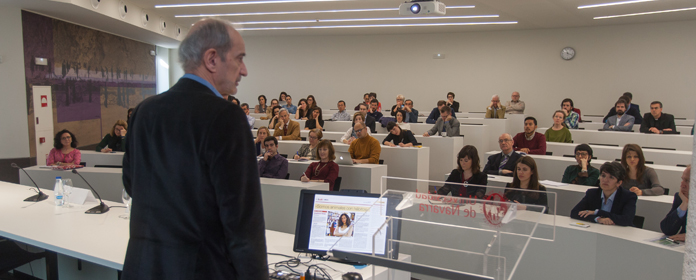"We come alive through dead words"
Dominique Maingueneau, a professor at the University of the Sorbonne, gave the keynote address about the circulation of phrases without context at the IV ICS Lecture

FOTO: Manuel Castells
"The living show that they possess reason with arguments that a dead man uttered before them. The paradox is that we become alive through dead words," or so argued Dominique Maingueneau, a professor of linguistics at the Paris-La Sorbonne University, who gave the IV ICS Humanities and Social Sciences Lecture at the Institute for Culture and Society of the University of Navarra.
In his lecture entitled, “Living words, dead words: Phrases without text,” the expert analyzed a common phenomenon, especially in the media, that involves the circulation of sentences outside of their original context. This is the case of quotations in headlines, slogans, aphorisms, etc.
Along with this, there is another form of verbal production from texts: super-sayings generated from a set of writings. This is what happens in the process of producing a writer’s complete works, which are actually created by a third party.
In both cases, Professor Maingueneau distinguishes two linguistic subjects, the speaker and the aphorizer. The former person actually produces the text to which the phrase belongs, while the latter is a new person who speaks to a community beyond the immediate recipients. In an article, for example, a speaker addresses a journalist; when the journalist quotes his words, the quote "speaks with humanity," he said.
The Sorbonne professor emphasized that, in this way, even if the speaker no longer speaks, the being that pronounces the phrase- the aphorizer- continues to exist.
Ordinary and extraordinary wordsAs indicated, this phenomenon is related to human beings’ capacity to produce ordinary and extraordinary words: "When they were uttered, they came from normal texts. Now they circulate in a kind of heaven and are considered extraordinary because we make them so," he said.
As an example, he mentioned Martin Luther King's “I Have a Dream” speech, which, in the original speech, was used as a rhetorical device (anaphora) to improve his argument. It has since become a symbol of King’s life.
The tendency toward “sentences without context,” in Maingueneau’s opinion, is on the rise since direct discourse and the absence of mediation are valued. He pointed out that this can be seen in headlines, which usually consist of direct quotations between quotation marks.
Maingueneau recalled that phrases have "extraordinary power" and lamented the lack of ethics on the part of people who highlight a quotation without respecting its context’s original meaning. "Outside of context, there is no strategy (public or argumentation) so the reader’s imagination can run wild." In that regard, he recalled that in France the courts condemn sentences, not texts.
Manipulation and populismsIn this framework of manipulation, Maingueneau brought up the topic of populist discourse and maintained that it exists in reaction to other discourses: "Populists and the political elite are an inevitable pair and both explain themselves with the other." He pointed to the examples of Marine Le Pen and Le Monde or Donald Trump and the New York Times. He stated that these newspapers criticize them on a regular basis "to prove that they are an elite newspaper that despises such people." For their part, when politicians "talk about elite newspapers, they say they ignore everyday people’s problems."
Finally, Professor Maingueneau commented that since the Second World War and with the emergence of television, there has been a "profound transformation of our relationship with verbal production." He emphasized that, "words are not enough" and to show it, he compared newspapers from a century ago, in which information was available in columns shaped by a mass of text, with those of today in which "language is more multimodal; readers need pictures, color, captions, etc.”
Dominique Maingueneau, is a Professor of Linguistics within the School of French Language at the University of Paris-La Sorbonne. He delivered the 16th ICS Lecture on Humanities and Social Sciences at the Institute for Culture and Society on March 16, 2017. This lecture series receives funding from the Obra Social "La Caixa" and Caja Navarra Banking Foundations.




